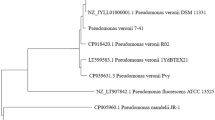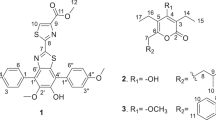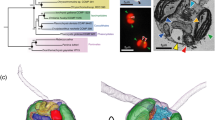Abstract
MEMBERS of the genus Nocardia can use certain long-chain saturated aliphatic hydrocarbons (C10–C18) as sole carbon and energy source1, but very little information is available about the mechanism by which these compounds are broken down by microorganisms2. In the present work the breakdown of 1-phenyldodecane, 1-phenyldecane, 1-phenyloctadecane, 3-phenyleicosane and 1-(α-naphthyl)hendecane by N. opaca (strain T16) and Nocardia spp. (strain P2) has been shown to give substituted fatty acids. The shorter-chain ethyl, n-propyl and n-butyl benzenes were not attacked. In the following the methods, detailed by Webley, Duff and Farmer3 were used.
This is a preview of subscription content, access via your institution
Access options
Subscribe to this journal
Receive 51 print issues and online access
$199.00 per year
only $3.90 per issue
Buy this article
- Purchase on SpringerLink
- Instant access to the full article PDF.
USD 39.95
Prices may be subject to local taxes which are calculated during checkout
Similar content being viewed by others
References
Webley, D. M., J. Gen. Microbiol., 11, 420 (1954).
Beerstecher, jun., E., “Petroleum Microbiology” (Elsevier Press, New York, 1954).
Webley, D. M., Duff, R. B., and Farmer, V. C., J. Gen. Microbiol., 13, 361 (1955).
el Masry, A. M., Smith, J. N., and Williams, R. T., Biochem. J., 61, (1) (1955).
Author information
Authors and Affiliations
Rights and permissions
About this article
Cite this article
WEBLEY, D., DUFF, R. & FARMER, V. Evidence for β-Oxidation in the Metabolism of Saturated Aliphatic Hydrocarbons by Soil Species of Nocardia. Nature 178, 1467–1468 (1956). https://doi.org/10.1038/1781467b0
Issue date:
DOI: https://doi.org/10.1038/1781467b0
This article is cited by
-
Enrichment of aliphatic, alicyclic and aromatic acids by oil-degrading bacteria isolated from the rhizosphere of plants growing in oil-contaminated soil from Kazakhstan
Applied Microbiology and Biotechnology (2015)
-
Identification of phenylalkane derivatives when Mycobacterium neoaurum and Rhodococcus erythropolis were cultured in the presence of various phenylalkanes
Applied Microbiology and Biotechnology (2012)
-
Biodegradation of commercial linear alkyl benzenes byNocardia amarae
Journal of Biosciences (1996)
-
Microbial oxidation of cumene
Journal of Industrial Microbiology (1994)
-
The degradation of 1-phenylalkanes by an oil-degrading strain of Acinetobacter lwoffi
Antonie van Leeuwenhoek (1985)



